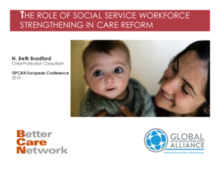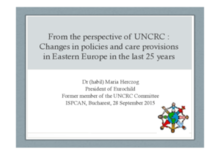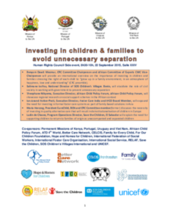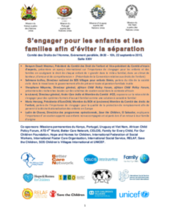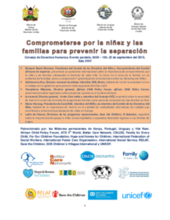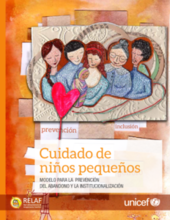Displaying 611 - 620 of 1025
This presentation was given by Beth Bradford at the ISPCAN European Conference in September 2015.
This presentation was given at the ISPCAN Conference in Bucharest, Romania in September 2015. The presentation reviews similarities and differences in national care reform efforts in the Eastern Europe region, highlights the main care-related issues in the region 25 years ago, describes the reforms and improvements made in the region as well as the challenges and responses to reforms, and provides recommendations for the way forward.
This video gives an inside look at an assisted family setting in Ghana where children with disabilities live with their foster mothers. It highlights the increased risk of family separation faced by children with special needs and advocates for the provision of quality family-based care to children who cannot be with their parents or extended families.
This Human Rights Council Side event included presentations on family separation in the African, Asian, European, and Latin American contexts.
This video is presented by Better Care Network and UNICEF. It tells the story of Maureen, a young girl in Kenya who was separated from her family and sent to live in a children's home. It also features interviews with experts, including those who have lived in children's homes, explaining some of the negative impacts of institutionalization and highlights the efforts of Care Reform Initiatives to deinstitutionalize children in Kenya and Ghana.
This Human Rights Council Side event included presentations on family separation in the African, Asian, European, and Latin American contexts.
This video is presented by Better Care Network and UNICEF. It tells the story of Maureen, a young girl in Kenya who was separated from her family and sent to live in a children's home. The video also features interviews with experts, including those who have lived in children's homes, explaining some of the negative impacts of institutionalization and highlights the efforts of care reform initiatives to deinstitutionalize children in Kenya.
Este evento paralelo del Consejo de Derechos Humanos incluyó presentaciones en separación familiar en los contextos africanos, asiáticos, europeos, y latinoamericanos.
This article is an attempt to analyse and describe the process of change in child substitute care that has taken place since the re-independence of Estonia in 1991.

